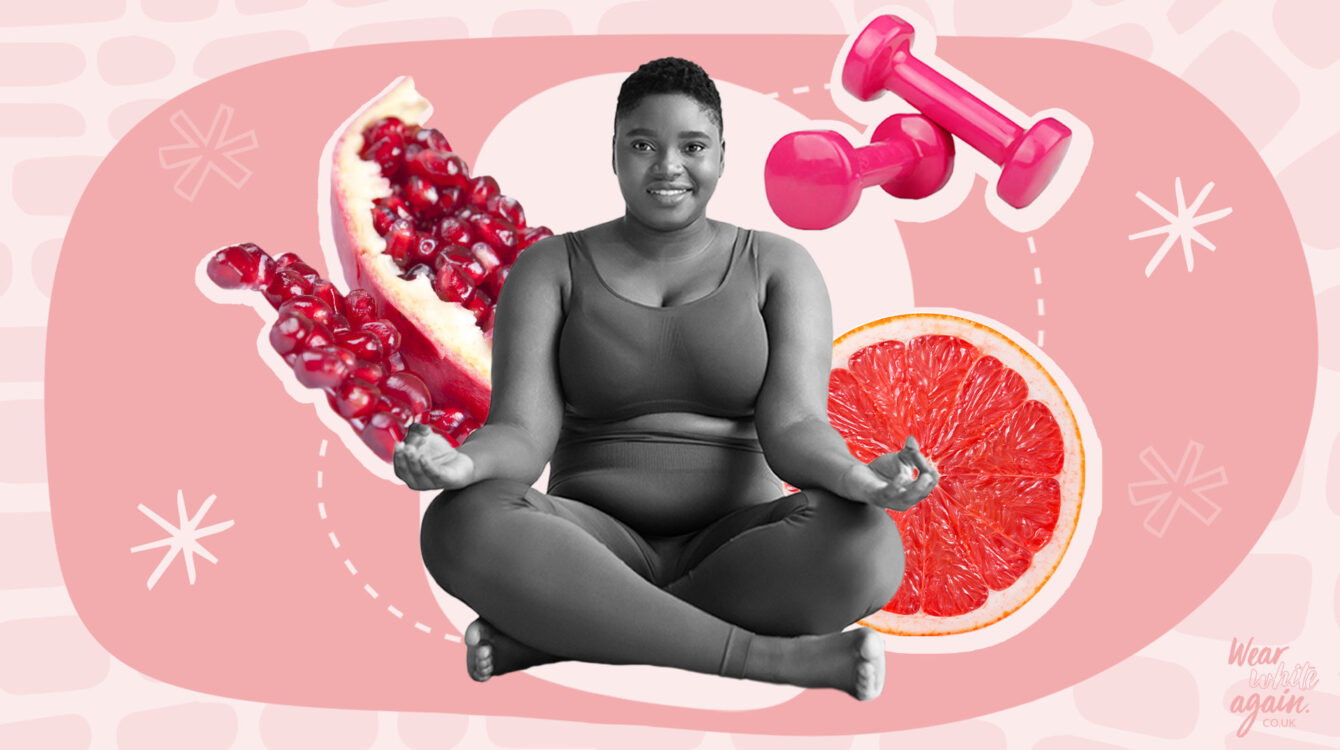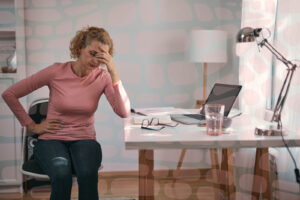
How Lifestyle Can Have an Effect on Your Menstrual Symptoms
How Lifestyle Can Have an Effect on Your Menstrual Symptoms
Are menstrual problems something that can only be solved by the doctor? Or does it help if you adjust your lifestyle?
Starting with the bad; or good news – it all depends on how you look at it – there is evidence that lifestyle changes can help reduce menstrual symptoms. More exercise and adjusting your diet are the first step for many health problems.
It is no different when it comes to menstrual problems. Of course, this does not mean you can cure a medical condition such as Heavy Menstrual Bleeding (HMB), Polycystic Ovary Syndrome (PCOS) or endometriosis with lifestyle changes. However, it seems that you can relieve certain period symptoms, such as fatigue, bloating, or severe menstrual cramps.

The Effect of Movement on Menstrual Symptoms
Introducing movement (instead of lying on the couch) may sound like the opposite of “listening to your body.” However, you usually feel better if you put your trainers on and get moving. That doesn’t mean you have to train for something big, like a marathon, but with just half an hour of swimming laps, walking the dog, gentle stretching, and some yoga exercises (not the exercises where you are upside down; they have the opposite effect!) or dancing, you can also see results.
In fact, moderately intensive sports are better in many cases. Endurance sports and high-intensity training increase your stress hormone level and cause more disruption of the menstrual cycle.
The movement during exercise improves blood flow and loosens muscles, including those of your lower abdomen, back, and legs – the calibrated “problem zones” during your period. Exercise also releases a natural painkiller – endorphins, that inhibit the production of prostaglandin, a hormone-like substance that plays a role in the contraction of the uterus.
Therefore, movement can reduce the impact of cramps. It also increases the production of serotonin, a neurotransmitter that boosts your mood, well-being, self-confidence, and impulse control. The latter comes in handy if you want to adjust your diet.

Food That is Good for Your Body During Your Period
Craving unhealthy snacks, the week before your period is a poorly kept secret. Unfortunately, sugar, fat, salt, caffeine, and alcohol are not the best foods to help suppress menstrual complaints. For example, you often retain fluids the week before your period (think sore breasts and temporary weight gain). Drinking extra water or diuretic herbal tea and eating less salt is better than ordering fries or a pizza.
The same goes for those extra cups of coffee with which you hope to combat that listless feeling. Caffeine raises blood pressure and makes you sleep less well. The result: more fatigue and an even shorter fuse (mood swings).
Iron deficiency could also be the cause of that listlessness. The more blood you lose during your period, the greater the chance of iron deficiency or anaemia. You can (partly) counteract this by eating extra iron-rich foods, such as meat, legumes, green vegetables, fish, nuts, whole grain bread, and dried fruit (apricots), and by supplementing your diet with extra vitamin C. If your haemoglobin (Hb) level is chronically low, it’s important to look at the underlying cause.
The Endometriosis Dietary Recommendations
Although there is still too little scientific research to draw any firm conclusions or develop guidelines, there is some evidence that dietary changes can reduce menstrual symptoms, such as pain, fatigue, and bloating. For example, red meat, refined sugars, soy, and other foods containing phytoestrogens are thought to trigger inflammatory responses that play a role in endometriosis. With PCOS, losing weight is often the first step in treatment.1
Studies on the effect of a gluten-free, low-FODMAP diet (avoiding certain sugars) and the endometriosis diet have shown positive results. The effect of the endometriosis diet was researched at the Endometriosis Centre of the Amsterdam UMC, showing that dietary interventions are promising in the treatment of endometriosis-related symptoms.2 In a different study among women with endometriosis, 55.5% experienced that changing their diet alleviated their symptoms. This could be because many patients experience gastrointestinal symptoms, and more research is needed on the topic.3
The effect of dietary changes is difficult to measure because other factors, such as smoking, stress, obesity, and air pollution, also influence it. Whether or not you have problematic menstrual symptoms; it is always a good idea to eat healthily.
In a nutshell, this means as few fast carbohydrates as possible (sugars, white bread, white rice, and pasta) and pre-processed foods from packages and bags, and more different types of vegetables, fruits, fibres from whole grain products, good proteins, and fats, as well as drinking at least 1.5 litres of fluid per day (water, herbal tea).

Looking After Your Mental Health Whilst on Your Period
Don’t forget the mental side of the story. Chronic stress messes up your hormone system, and that affects all kinds of body processes. If you have cramps, get some rest, take a warm bath, or place a hot water bottle on your stomach or back. As we have already discussed, participate in relaxation exercises such as yoga. Take yourself and your health seriously, and most importantly, listen to your body!
If lifestyle adjustments don’t offer enough relief and you still must adjust your daily activities around your menstrual cycle, make an appointment with your doctor or general practitioner. A medical examination is important to rule out underlying health risks.
Help, I am suffering from Heavy Menstrual Bleeding.
Heavy Menstrual Bleeding (HMB) is a recognised medical condition (menorrhagia) with several treatment options in the UK. You don’t allow yourself to suffer from other health problems, do you? So why should women suffer from gynaecological complaints?
Struggling to figure it out with the doctor?
Then seek more information on our treatments page: Treating Heavy Periods as options to discuss with your doctor, or ask for a referral to see a gynaecologist.
The #BeBloodyConfident campaign aims to help women speak to their GPs about getting the required treatment to help ease heavy menstrual bleeding symptoms and regain control of their menstrual cycle.
To help feel more in control of the conversation with your GP, download our free period toolkit to help track and identify trends in your menstrual cycle.
Note: This article does not constitute medical advice. Please consult your doctor should you have any concerns regarding the topics discussed in this article.
1 – NHS (2019). Treatment – Polycystic ovary syndrome. [online] NHS. Available at: https://www.nhs.uk/conditions/polycystic-ovary-syndrome-pcos/treatment/. [Last accessed: 04/03/2023]
2 – Nap, A. and de Roos, N. (2022). Endometriosis and the effects of dietary interventions: what are we looking for? Reproduction and Fertility, 3(2), pp.C14–C22. doi:https://doi.org/10.1530/raf-21-0110. [Last accessed: 04/03/2023 – https://www.ncbi.nlm.nih.gov/pmc/articles/PMC9259892/]
3 – Krabbenborg, I., Roos, N. de, Grinten, P. van der and Nap, A. (2021). Diet quality and perceived effects of dietary changes in Dutch endometriosis patients: an observational study. Reproductive BioMedicine Online, [online] 0(0). doi:https://doi.org/10.1016/j.rbmo.2021.07.011. [Last accessed: 04/03/2023 – https://pubmed.ncbi.nlm.nih.gov/34493462/]




